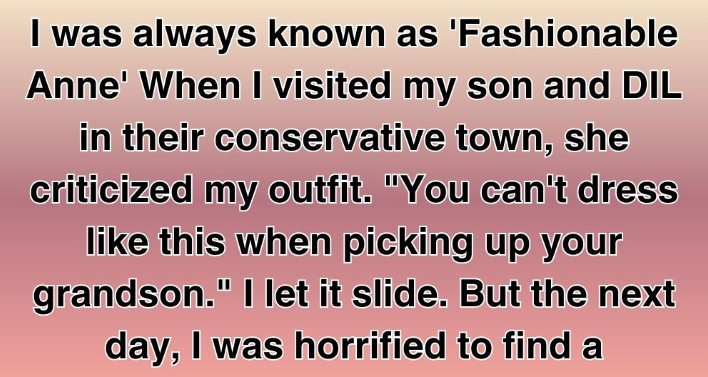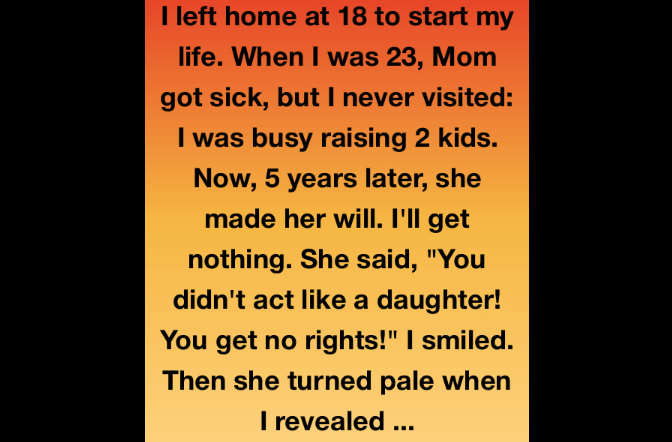I’ve always been known as Fashionable Anne. When I traveled to see my son and daughter-in-law in their traditional community, she commented on my attire. “That outfit isn’t suitable for picking up your grandson,” she remarked. I brushed it off. But the following morning, I was stunned to discover a note taped to the guest bathroom mirror. In bold lipstick, it declared, “Time to act your age.”
Initially, I assumed it was a prank. Perhaps my eight-year-old grandson, Zaki, was up to his usual tricks. He’s clever and playful, but he knows better than to touch makeup without permission. As I studied the note, my pulse quickened. The handwriting was far too neat for a child’s.
I quietly cleaned the mirror. At breakfast, I stayed silent, spreading butter on my toast while my daughter-in-law, Lianne, spoke about Zaki’s school achievements in her usual polished tone. “He’s excelling in literacy metrics,” she said, sounding like a corporate report. My son, Amir, sat quietly, his gaze fixed downward. He used to be so full of laughter before their marriage.
I had flown from Minneapolis for a week to assist while Lianne took on a temporary work project. Amir had pleaded for my help. “Mom, it’s only a few days. We need you, and Zaki misses you.” So I packed my vibrant wrap dresses, long coats, and signature accessories—a bold ring, red manicure, and a bright scarf. Neutral tones have never been my style.
It seemed Lianne took issue with that.
On the first day, she made several remarks. She questioned if I had “more suitable” shoes for school runs and suggested I “tone it down” at the local café because locals might gossip. I smiled politely. I was a guest in her home, on her territory, and I wanted to keep the peace.
But that lipstick note struck a nerve I hadn’t felt in years.
That evening, after they’d gone to bed, I checked the trash. There it was—my YSL lipstick, mangled and broken, as if someone had crushed it in anger. A wave of frustration and disbelief washed over me. Who would do such a thing? If Lianne disliked my style, why not address it directly?
I called my lifelong friend, Meera, who’s known me since our teenage years in Mumbai.
“She’s envious,” Meera said. “You carry a confidence she’s never mastered.”
I chuckled, but her words resonated. Lianne always appeared flawless but predictable—muted colors, sleek hair, minimal makeup. Her aesthetic matched her demeanor: meticulous, restrained, no risks.
I began to notice other patterns.
Lianne rarely engaged with Zaki. Every interaction was planned, even their embraces. Amir handled cooking, cleaning, and bedtime routines. She retreated to her office at 6 p.m. without fail, citing “deadlines.”
One day, while sorting laundry, I found another note, slipped beneath Zaki’s T-shirt in the guest room drawer: “You’re not deceiving anyone.”
I froze. Was this intimidation? Was she trying to push me away? It felt petty, yet deliberate.
I spoke to Amir that night, treading carefully to avoid conflict. He seemed conflicted.
“She’s overwhelmed with work,” he said. “Maybe it’s not as bad as it seems.”
“Do you think she’s not the one leaving these notes?”
He rubbed his temples. “Honestly, I’m not sure anymore.”
Two days later, while walking Zaki home from school, he asked a question that gripped my heart.
“Why does Mom say you’re trying to take her place?”
I stopped in my tracks. “She said that?”
He nodded. “She said if you stay too long, you’ll want to be my mom. But I told her that’s ridiculous—you’re Nani. You’ve got your own role.”
I pulled him into a tight hug, perhaps too tight.
That night, I couldn’t sleep. I thought of my late husband, Kareem, who always said people reveal their true selves when they feel vulnerable. Was I a threat to Lianne? If so, why?
The next morning, I chose to confront the issue.
After Zaki left for school and Amir was at work, I invited Lianne for coffee. She sighed, offering a stiff smile.
“I know you don’t approve of my style,” I started. “We’re different, and that’s fine. But I don’t think it explains what’s been happening.”
Her face remained impassive.
“I found notes. My lipstick was ruined. And you said something to Zaki that upset him.”
She tilted her head, her tone icy. “I have no idea what you mean.”
I waited for a hint of vulnerability. None came.
I nodded slowly. “Maybe I’m mistaken. But you might want to think about the signals you’re sending. To your son. To your husband. To yourself.”
I left it there. The rest of my visit was polite but distant. I cut my trip short by a day. At the airport, Amir gave me a lingering hug.
“She’s not always like this,” he murmured. “Something’s wrong. I don’t know what.”
Back home, I tried to move on. But three weeks later, Amir called, his voice unsteady.
“Mom, I found something,” he said.
While searching for a charger in their home office, he’d stumbled across Lianne’s journal. He hadn’t meant to pry, but something urged him to look. The recent entries were about me.
“She wrote that she felt like she was losing her grip,” he said. “That you reminded her of everything she’d suppressed. I didn’t get it until I read further.”
Lianne’s mother had been vibrant and unpredictable—much like me. But she had abandoned the family when Lianne was a teen, leaving with someone else and causing upheaval.
“She sees you and sees her,” Amir explained. “She’s projecting.”
I felt a swirl of emotions—sorrow, empathy, and a quiet relief. I hadn’t been imagining it.
“I’m sorry I doubted you,” Amir said.
“You did what you could,” I replied. “We all carry burdens we don’t voice.”
Days later, Lianne sent me an email. It was surprisingly candid.
She admitted to writing the notes. She said my presence had “unsettled” her, stirring memories she hadn’t faced. She apologized for her actions and expressed hope that I might one day forgive her.
I didn’t respond immediately. I let it sit, giving it space.
Then I wrote back.
I accepted her apology. I acknowledged the pain her actions caused but said I understood their roots. I suggested we try again—not as adversaries or allies, but as two women navigating the messy ties of family.
Since then, we’ve made small strides.
Last week, she sent a photo of Zaki wearing one of my scarves, spinning like a young prince.
“No one wears color like Nani,” she wrote.
I smiled. Healing doesn’t always look like an embrace. Sometimes, it’s a quiet thread, stitching together what was once torn.
Life has shown me that people often lash out from unhealed wounds. Forgiveness doesn’t erase the past, but it opens the door to growth over resentment.
If this story touched you, share it with someone facing their own family challenges ❤️




